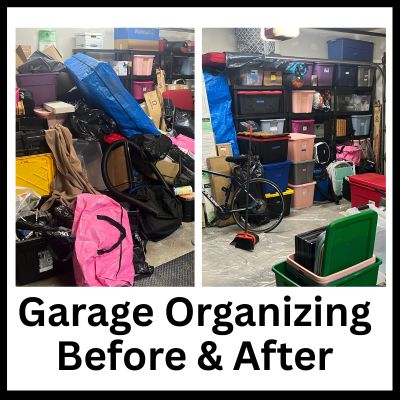Fixing Things

The majority of clutter is delayed decisions. Within the category of “delayed decisions” is “things that need to be fixed.” Some of these things are very trivial and easy to fix. Others are much more complex and require multiple steps to complete, and may even include learning a new skill. Or you might have to pay someone else to fix it and decide whether it’s worth it to pay someone to fix it, or you should just buy a new one. Sometimes it’s worth it to fix something. Other times, it’s really not! But it can be really hard to make that decision. Making the time to fix it can also be hard to prioritize. In this post, I’ll tell you a personal story about my vacuum, and will give you some tips on how to decide if something is worth fixing or not.
Here’s an example of a personal story where it was well worth my efforts to fix my broken vacuum:
Recently, my beloved Dyson stick-vacuum was starting to fail. I got this vacuum in early 2020, right when the pandemic was starting, and I use it all the time. I’ve got a sentimental attachment to it. I also really love using it! While it was under warranty, I had the battery replaced. Then I got it serviced earlier this year. Shortly after that, I broke the canister. I was able to easily replace that part at the same vacuum shop that serviced it because someone else had given their old vacuum to the shop, and I was able to use their canister. I was thrilled that I didn’t have to wait for the part, and I got to reuse something that would otherwise go to waste! But now I don’t live near any vacuum repair shops, so I had to figure out what to do when my vacuum was on the fritz. And it broke on the day we were moving too! So I had to do a move-out clean of my whole house without my vacuum! (The others were already down in New Mexico!). I was kind of panicking because I knew it wasn’t under warranty anymore, and I didn’t want to just throw it out and buy a new one. Not only are Dysons expensive, but I didn’t want to contribute more than necessary to the landfill, and I love my sweet little vacuum! Luckily, I was able to get someone from Dyson on a video call, and he helped me troubleshoot. After some quick diagnostics, he told me that I needed a new motor. A new motor is significantly cheaper than buying a new one, but they were out of stock. He told me the sku and directed me to Amazon. A few days later, the box came! With a little You-Tubing and [actually] reading the directions, I was able to get my vacuum working in no time! Yay!! The time, effort, and money I spent fixing this was greatly outweighed by my satisfaction of getting to use my favorite vacuum again!
Things to take into consideration when you’re deciding to fix something or not:
- What is the cost of repair versus the replacement cost? Make sure to take into consideration whether or not there is a diagnostic fee. Sometimes it can be hard to even find someone who can repair it.
- Is it under warranty?
- What is the typical lifespan of the item? What’s the condition of the item?
- Have you had to fix the same issue more than once?
- How easy is it to fix? Do you have all the skills necessary? Would you enjoy fixing your broken item?
- How essential is this item? Do you even still like it?
- How sentimental is this item? If you decide not to fix it, is it really worth keeping something that’s broken? And on a personal note, I have kept a broken model horse for over 35 years and am just now getting it fixed. No, I don’t usually keep broken stuff, but this horse is very sentimental to me, and I finally met someone who knows how to fix him! Sure, I probably could have found someone to fix him years ago if I really tried, but since I could store him with all the rest of my model horses, I was ok with letting this little project stay on the back burner until the time was right. However, don’t use this excuse for everything! Take the time to be conscientious about the broken stuff you’re hanging onto.
- Is it even possible to replace your item with something similar? Or is it discontinued or one-of-a-kind?
- How valuable is the item? If you’re not sure, search the eBay “sold listings” to see if you can figure out what they’ve recently sold for.
- Are you just keeping something broken out of guilt? Or hopes that you’ll find a missing part? While I can’t guarantee you’ll never find that missing piece, the majority of the time, unless it’s something VERY meaningful to you, it’s probably not worth hanging onto.
Make a decision rather than delaying.
- (Don’t underestimate this step!) Make a list of all the things that need fixing. Categorize this list by who can fix them. Make a list of all the things you are willing to fix, and make separate lists if you’ll need to hire a handyman, computer repair person, plumber, electrician, seamstress, etc. Having an inventory of all the things that need fixing will benefit you in several ways. One, it will help you realize how many things actually need fixing! Two, the process of making the list will inevitably help you decide which things are even worth putting on the list. Three, when you do go to hire a handyman or whoever, you can get multiple projects done at once so that it will be worth the service charge.
- This point can cause some serious procrastination for lots of people! Repairing is often more environmentally friendly than replacing, but not if the broken item is going to litter your house indefinitely! If you don’t want it, do your best to get it to someone else who can either recycle it or fix it themselves. Give yourself a deadline though. If it’s not re-homed by X date, give yourself permission to throw it out.
- Make space and time for the really important things in your life. If fixing the item aligns with your goals and values, by all mean, fix it! But if it’s not that important or fixing it will take too much time away from the people and activities that are really important, go ahead and let it go!
- Decide when and where you will fix it. Put it on your calendar. Make the necessary arrangements to block out your schedule so you can get it done! Remember, if you’re saying “yes” to fixing something, you’re going to have to say “no” to something else.
- Alleviate stress. As painful as it may be to make a decision, it will help give you mental clarity and peace of mind. Reducing physical clutter will help you reduce mental clutter as well!
- Build confidence with yourself! Once you’ve weighed all your options, make a decision. Otherwise, the delayed decisions will accumulate, and you’ll always feel swamped. Make peace with potential regrets. Trust yourself!
- Set an example for other people in your home or life. When they see how freeing it is for you to make decisions and either “do the thing” or “let it go”, they will get inspired and follow suit.
Go do it!
Now that you’ve read this article, what are you going to finally fix? Or what are you going to let go of?

Posted By Jean Prominski, Certified Professional Organizer
- Follow me on Instagram @seattlesparkle
- Join my Facebook Group, Declutter and Organize with Seattle Sparkle.
- Ready to book a consultation? Complete this form.




